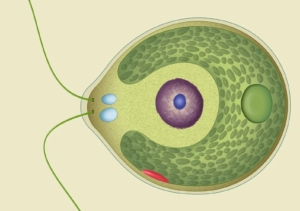Using a species of algae, researchers at the University of California have built a microscopic robots that can move drugs in the body directly in the vicinity of disease-causing pathogens.
When you swallow a normal medicine, only a part of the medicine reaches where it is needed. The active compounds of the drug dissipate across the intestinal wall and dilute in the blood, drifting around aimlessly. For more specific drug delivery researchers use mobile single-celled organisms as vehicles that transport drugs to specific parts of the body.
The researchers attached nanoparticles filled with antibiotics to the surface of the microbes. Each nanoparticle is wrapped neutrophil membrane, which promotes immune evasion and allows microrobots to engage with pathogens, by depositing medicines near them.
The researchers tested the algae on mice with severe pneumonia caused by the bacteria. The microrobots were delivered directly into the mouse’s lungs via a tube inserted into the trachea. Infections disappeared after one week in all treated mice. Their untreated littermates died within three days.
Source: The Scientist

